Are you stuck in the endless loop of repetitive marketing tasks, missing crucial follow-ups, or struggling to offer personalized customer experiences? With marketing automation artificial intelligence, businesses can now overcome these challenges.
Imagine a tool that not only saves time but also helps you connect with your customers in a smarter, more meaningful way. By automating repetitive work, organizing your data, and delivering tailored messages, AI-driven marketing automation makes running campaigns easier and more effective. This blog will guide you through how it works and why it’s a must-have for any business.
Understanding AI’s Role in Marketing Automation

Artificial intelligence in marketing, is fundamentally a system designed to learn from data and adapt its behavior accordingly. When applied to marketing automation artificial intelligence and marketing work together to process massive amounts of information, uncover trends, forecast customer actions, and make split-second decisions.
AI’s contributions in digital marketing don’t stop there. It improves the search visibility and optimizes the value of content posted on the website. Semrush claims that, currently, 65 % of marketing gurus have enhanced their SEO efficiency using artificial intelligence marketing automation, while 68% of marketers have enhanced the return on investment of content marketing.
Another fantastic element of artificial intelligence used in marketing is dynamic personalization. This One changes the message/content based on the individual’s profile and behavior. According to Segment, 70% of business leaders believe the application of marketing automation in marketing will revolutionize customization and marketing strategies, with 58% predicting AI chatbots will lead personalization within five years.
As AI continues to evolve, its role in marketing automation will only become more significant. Businesses investing in this technology are positioned to stay ahead of the curve and reap long-term benefits.
Why is Marketing Automation Important?
Marketing automation has become a critical tool for modern businesses for several reasons:
- Seamless Communication: Both B2B and B2C companies rely on automation to keep their marketing messages timely and relevant.
- Boosted Productivity: Automating repetitive tasks allows teams to focus on creative and strategic initiatives.
- Efficient Organization: Centralized systems ensure that data is well-organized and workflows are smooth, helping prioritize tasks effectively.
Using marketing automation artificial intelligence makes it easier for businesses to focus on meaningful work, like customer engagement and business growth.
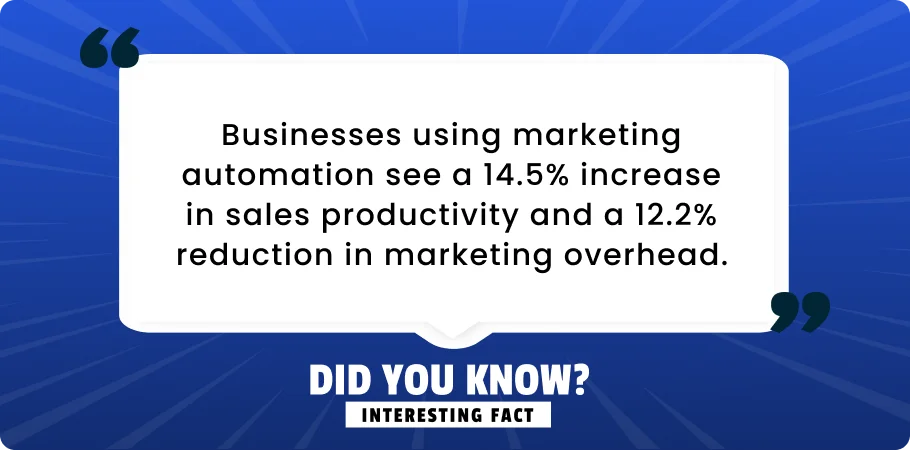
How Does Marketing Automation Work?
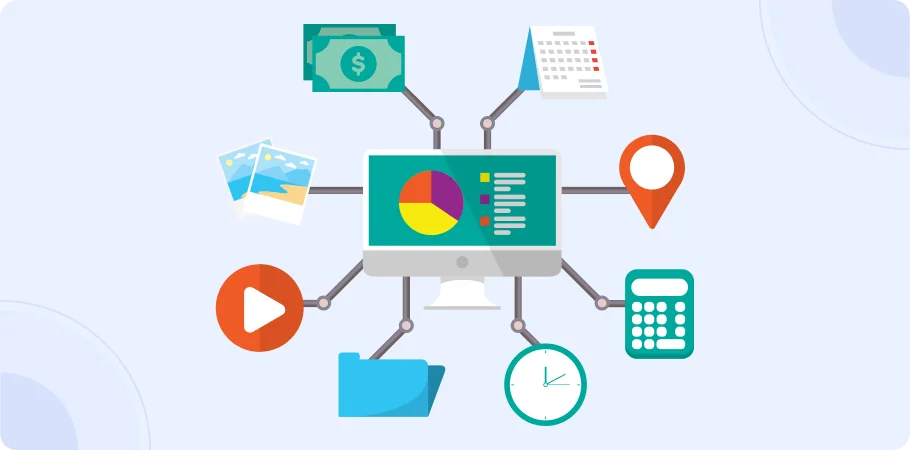
The primary aim of marketing automation is to replace manual tasks with automated processes, saving time and effort. Here’s how it is leverage ai marketing automation works:
- Data Gathering: The software gathers important data about customer interactions based on website visits, emails clicked, and posts on social platforms.
- Audience Segmentation: This data helps to segment the customers based on their preferences and the behavior that they exhibit in the course of doing business.
- Tailored Campaign Development: Automation tools create customized campaigns targeting specific segments.
- Content Delivery: Messages are sent through the right channels at the perfect time, ensuring maximum effectiveness.
- Nurturing Leads: The use of artificial intelligence in marketing ensures potential customers are guided through the sales funnel with timely and relevant actions.
- Performance Tracking: It analyzes results for the organization and provides insights into the optimization of campaigns for enhancing the results.
Benefits of Marketing Automation
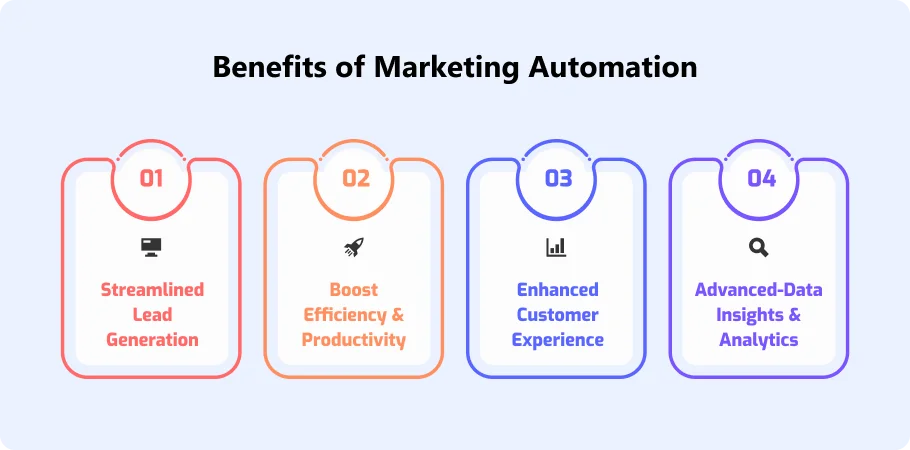
1. Streamlined Lead Generation:
Lead generation and management are the core of any business. Marketing automation examples, like email campaigns or social media lead captures, demonstrate how automation collects customer data from various platforms. In place of multi-carrier issues or lead data manipulating automation collects customer information from various places such as social media management as Facebook or any website.
The structural setup also enables you to be able to sort out high-value leads based on your lead scoring/ranking and a way to automate an organization’s emails in a way that contacts get relevant messages depending on the phases they are in. Auto-responders help to follow up the leads at regular intervals, and no lead is neglected.
2. Boost Efficiency & Productivity:
Marketing automation software takes over repetitive tasks like scheduling posts or sending bulk emails, allowing your team to focus on creative and strategic initiatives. It allows your team to shift their focus to high-impact projects, like crafting compelling campaigns or analyzing strategies.
Automation acts as a virtual assistant, streamlining workflows, assigning tasks, and tracking progress. This not only boosts output but also improves the overall quality of work.
3. Enhanced Customer Experience & Loyalty:
Today’s customer base is looking for customized attention, and this is well provided by automation. It enables marketers to provide the exact message their clients need, mapping the client’s journey through the funnel.
Once a user expresses interest in a product, the automation guarantees that he or she will get the right information at the correct stage. Such consistencies ensure trust and loyalty that create better relationships that are rewarding through repeat business.
4. Advanced-Data Insights & Analytics:
Understanding your customers and campaigns is critical, and marketing automation makes this easier. With built-in analytics, you can track performance metrics, measure customer behavior, and identify trends, all from one platform. Detailed reports highlight what’s working and what needs improvement, enabling smarter decisions. By centralizing data collection and analysis, automation ensures you’re always one step ahead.
Marketing automation isn’t just about saving time, it’s about unlocking your team’s potential, creating unforgettable customer experiences, and driving measurable results.
Best Practices for Successful Marketing Automation
Proper marketing automation isn’t about using ai marketing tools, at all, it is about using them efficiently. Here’s your recipe for automation success:
1. Know Your Audience:
When you do not know your audience, then ai powered marketing automation, is all but blindly throwing darts. Create detailed buyer personas and map out their journeys.
2. Start Small:
Begin with one or two processes, like email follow-ups or lead scoring, before expanding.
3. Keep Testing:
Like a chef experimenting with a dish, test your campaigns to see what’s working. A/B testing is your best friend.
4. Monitor and Optimize:
Continuously track performance metrics and be agile in making adjustments based on what the data reveals.
How to Implement Marketing Automation?
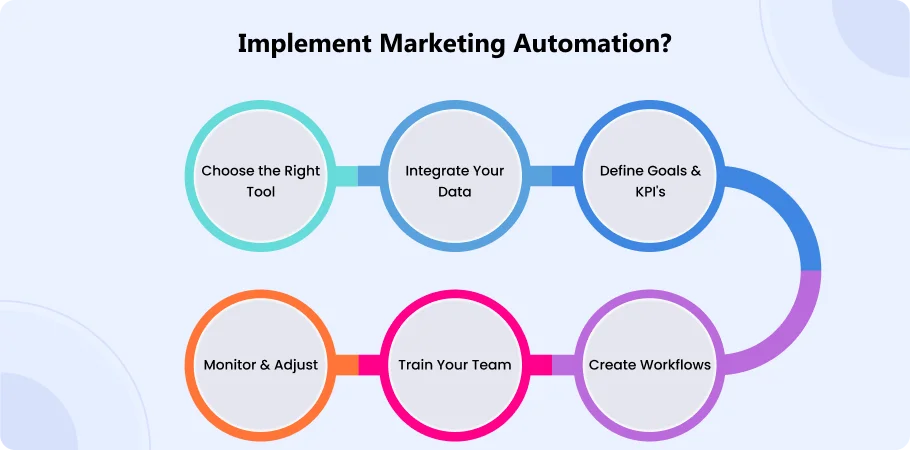
1. Choose the Right Tool:
Select the best tools for marketing automation used for marketing automation that suit your team’s size and objectives. If there are a few people in your company who will be using the software itself, it’s easier to focus on how simple the software is rather than how powerful it is.
Example: A startup would use Mailchimp for simplicity while a big company will use Hubspot for its many features.
2. Integrate Your Data:
Link your CRM with your marketing automation software to ensure seamless data flow and efficient information management.
3. Define Goals & KPI’s:
Do you want to increase your lead conversion rate or work to retain the customers you already have? Clear goals guide your strategy.
4. Create Workflows:
Design automated processes, like sending a thank-you email after a purchase or a reminder when a cart is abandoned.
5. Train Your Team:
It is always said that a tool is only as good as the people who are handling it. When you first decide to completely use linked data you will need to conduct training to ensure everyone agrees.
6. Monitor & Adjust:
Keep an eye on performance and tweak your workflows as needed.
Automate Smarter & Market Better with AI
Emerging Trends in Marketing Automation Artificial Intelligence
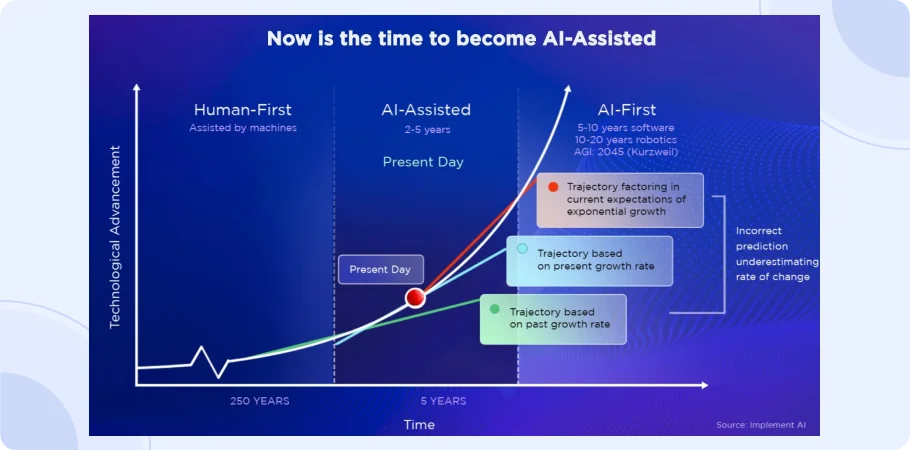
AI marketing teams is still developing and with it, new technologies and tools are changing the state of the marketing industry. Here are the latest trends reshaping AI marketing automation:
1. Redefined Ad Targeting:
Interactive advertising is now possible to employ highly accurate targeting that only AI can provide. Updating, today ad platforms such as Google AdWords use AI to determine who, when, and how to reach out to the target audiences and what kind of message to convey.
These tools of programmatic advertising are sophisticated structures to help enhance ad positioning and improve results from large datasets. For example, tools such ai algorithms as Wordstream’s Google Ads Grader analyzes campaigns and provide suggestions, on how to improve them.
2. Smarter Chatbots:
Conversational AI is extending chatbots to the next level. Significant investments in this technology are enabling chatbots to perform complex tasks, from processing transactions to managing order inquiries.
By 2023, these tools have become more conversational and human-like, making them indispensable for businesses looking to enhance customer engagement without straining resources.
3. Enhanced Predictive Analysis:
AI-driven predictive analytics is becoming a vital tool for marketers. This technology goes beyond analyzing past behaviors, it predicts future actions, enabling companies to make informed decisions and craft proactive strategies.
Businesses can now forecast trends, optimize resource allocation, and fine-tune marketing campaigns based on data-driven insights.
4. Rise of Multi-Modal AI:
Multimodal AI is emerging as a choice that combines textual and visual data alongside audio data. Currently, such tools are generative AI, which are equally effective in both text and visual material production.
After polls with marketers, 63% of them predicted that AI will become the leading of content creation and generator in the future, while 81% of the respondents believe that AI-created content is as good or even better than human-written content.
These advancements highlight the growing importance of artificial intelligence used in marketing and ai tools for achieving business success.
Conclusion
The challenges of modern marketing are real, but so are the solutions. Marketing automation, enhanced by artificial intelligence, offers a way to simplify your workload, reach your audience more effectively, and get better results.
From generating leads to keeping customers engaged, this technology can handle all the problems, so you can focus on what matters most, i.e. growing your business. It’s not about working harder, it’s about working smarter.
FAQ’s:
1. How does AI in marketing automation improve ad targeting?
AI analyzes vast datasets to refine audience targeting, ensuring your ads reach the right people at the right time with the most relevant content.
2. Can small businesses benefit from marketing automation?
Absolutely! Tools like Mailchimp, Centripe, and HubSpot offer scalable solutions that cater to businesses of all sizes, making automation accessible and effective.
3. What’s the difference between automation and AI-driven automation?
Traditional automation follows predefined rules, while AI-driven automation learns and adapts based on data, offering smarter and more personalized solutions.
4. How can we measure the success of our marketing automation efforts?
Track key performance indicators (KPIs) like lead conversion rates, customer retention, and campaign ROI to gauge effectiveness and identify areas for improvement.
5. Are AI-powered chatbots worth the investment?
Yes! Advanced chatbots enhance customer interactions, handle complex queries, and save time for your team, providing both efficiency and satisfaction.



